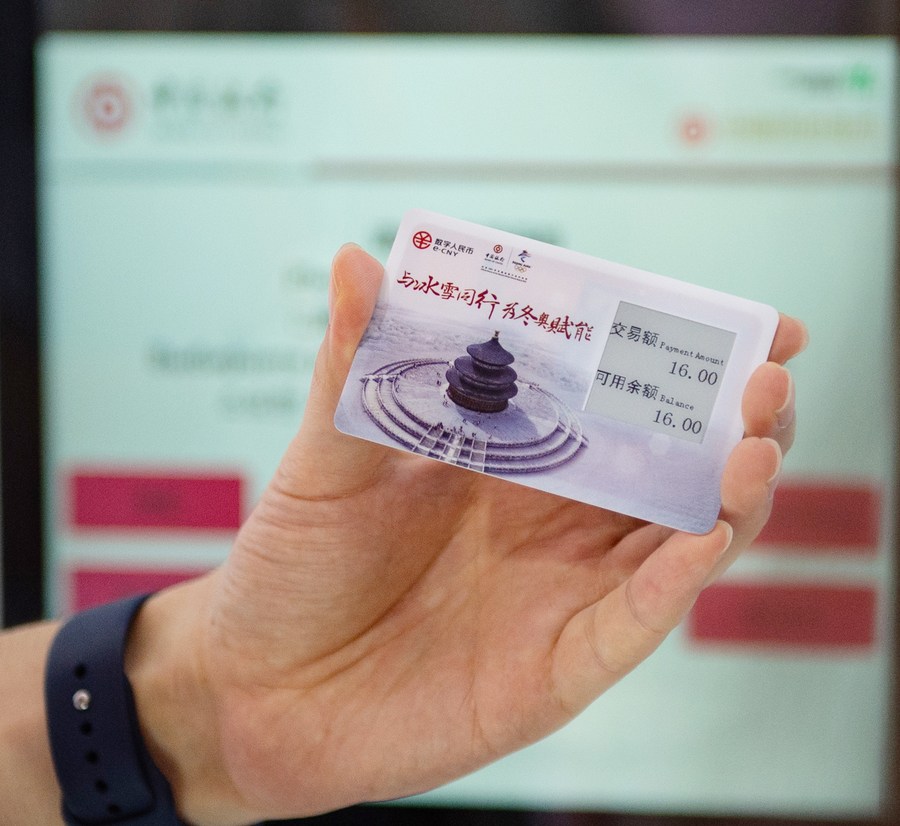China Leaps Far Ahead into Central Bank Digital Currencies Development

The West has been caught sleeping at the wheel yet again, while China has embarked on groundbreaking paths for introducing Central Bank Digital Currencies.
As the world has entered a new age when money becomes more digitalized, China has already made tremendous progress in the introduction of Central Bank Digital Currencies (CBDCs) and Western powers can only play catch up.
“China is much more advanced than all other countries,” Amnon Samid, a cyber security and digital assets expert and co-founder of an AI-powered cyber-innovation hub, BitMint, based in Tel Aviv, Israel, told China Focus in an exclusive interview via a video call.
“Ten years ago, I was working in Tianjin, China. In 2013, I was hearing that the People’s Bank of China (PBOC), China’s central bank was already launching research studies to explore CBDCs,” Samid added. “At that time, no other countries were even thinking about this topic. But now, we have about 114 jurisdictions around the world, such as central banks and government agencies, getting involved.”
The PBOC has already launched a number pilot projects nationwide in recent years to encourage Chinese citizens to use CBDCs for purchasing goods and services in their local communities. And to clarify, we should not confuse CBDCs with crypto-currencies. Whereas, crypto-money, such as Bitcoin, is a digitalized currency, it’s not backed by a central bank or government. CBDCs, when fully implemented, are endorsed by the central banks issuing them and will succeed as a more secured mode for digital financial transactions.
The development of CBDCs can also be differentiated from WeChat Pay, Ali Pay and Apple Pay as well. When we are using our smartphones to purchase goods or services and using WeChat Pay for example, that’s only a direct ‘account to account’ transfer. For CBDCs, it’s the actual money coming from a central bank but as a digitalized coin with value and a unique identity that can be stored in your phone. Hence, this is the new frontier for digital currencies’ development and the PBOC is marching swiftly ahead of all other central banks, including the U.S. Federal Reserve, Bank of England and European Central Bank.
“The major players, the central banks of the United States, United Kingdom and European Union, have only entered the research stage,” said Samid. “But the PBOC is moving towards the implementation phase. We saw it happening during the Beijing Winter Olympics in 2022. Foreign visitors staying inside the ‘Loop,’ (Olympics Village) could find vending machines. They would input US dollars into it and that would convert into digitalized Chinese yuan stored on a payment card. The card was using platform technologies based on CBDCs. Users could purchase goods and services with the card, anonymously, cash-like, but they could only do such transactions with sellers inside the ‘Loop.’”

China welcomes competition among its vendors
Meanwhile, the PBOC recognizes that introducing CBDCs comes with numerous security and functionality challenges. The skeptics have expressed grave concerns over privacy issues.
Accordingly, the PBOC has sought to address the privacy issue along with other challenges by formally establishing a “Digital Currencies Institute” and inviting scholars, experts, scientists and thought leaders from all over the world to brainstorm over and to mitigate potential problems with regards to CBDCs’ development.
The PBOC also takes a unique approach by encouraging more competition among its local players. Samid quoted the leader of the Digital Currency Institute saying that, “the CBDC trials are like a horse race with several technologies in the race to vie for the PBOC’s support. The technology or technologies proving to be most successful will be the winners.”
Adversely, the Western powers use a different strategy. They sign on to one consulting firm or a technology company after a government bidding process, while the winning bidder is expected to handle the workloads for the research and development of CBDCs back by their central banks. The lack of competition could lead to serious repercussions. Sometimes new problems could emerge and the hired firm might not have the best capabilities to provide the right solutions for that specific complication.
Furthermore, the central bankers in the West are imitating the cryptocurrencies, instead of producing and experimenting on several dedicated solutions for CBDCs, such as what we are seeing in China.
“China does not want to be dependent on one technology provider and is evaluating in parallel several families of solutions,” Samid explained. Well, as the saying goes, “competition breeds excellence.”
Another significant challenge for the CBDCs’ rollout on a nationwide scale is connected to providing direct access for the elderly and poor. The PBOC seeks to make CBDCs more inclusive to users and not to discriminate against people who can’t afford smartphones or don’t have WiFi coverage. Or let’s say you lost your WiFi coverage and in today’s times – it’s impossible to engage in a physical digital financial transaction under such circumstances. The PBOC is enhancing new technologies for making CBDCs go offline and still be effective.
“Off-line payments means that the payer and recipient should be able to validate that the locally stored digital money are genuine and to execute a transaction within seconds, making the payment final, even without Internet connection,” Samid said.
That’s remarkable but the PBOC continues to work on some other bugs before enacting the program. Samid added, “A key takeaway from comprehensive research published lately by the Bank of International Settlement (BIS) is that so far there is no ready for use solution that fulfils all uncompromisable requirements, for providing an effective, user-friendly and robust unlimited, sustained, offline payments with CBDCs that is perfectly counterfeit resistant.”

Tackling privacy concerns will be crucial
In recent weeks, according to Western media reports, the CBDCs’ skeptics have raised the anti-China card. They speculate that the Chinese government has ordered the PBOC to introduce CBDCs in order for Beijing to monitor all financial transactions of Chinese citizens and to enact punitive measures against users they deem are unfriendly to the ruling party – Communist Party of China.
According to Cointelegraph, President of the Minneapolis Federal Reserve Bank, Neel Kashkari, spoke at the Minnesota Transportation Conference and Expo on May 15. He gave a blunt assessment of CBDCs during the Q&A.
“We’re studying it,” Kashkari said of CBDCs, remarking that the Fed believes it would take an act of Congress to allow it to issue its own digital currency.
Kashkari asked rhetorically why China may have been motivated to introduce its CBDCs and answered, “In theory, a government could monitor every one of your transactions with a central bank digital currency.”
But when asked to respond to Kashkari’s claims, Samid argued that, “Funny, the Western powers keep complaining about China but if you look closely at how the central banks in the West intend to implement CBDCs, they will do exactly what they accuse China of doing.”
“Central banks around the world are interested in CBDCs for a variety of reasons, among them greater control of the economy and stronger surveillance of financial transactions, while this has caused great public sentiment against CBDCs,” Samid said. “Most central banks around the world just ignore existing safeguards to counter public concern over the risk of state surveillance.”
Apparently to the PBOC’s credit, China has enacted new privacy laws over digital financial transactions. The regulations are in place to prevent excessive monitoring of digital accounts by the Chinese government. Nonetheless, the central banks led by the Western governments haven’t followed up on similar digital security protocols. The Western central banks are acting hypocritical when chastising China over CBDCs.

China to lead, others to follow
The PBOC has played an instrumental role in the rise of CBDCs’ development on the world stage. The Western powers love to boast that political democratic freedoms can usher in more innovations in the science and technology sectors. Nevertheless, the West has been caught sleeping at the wheel yet again, while China has embarked on groundbreaking paths for introducing CBDCs.
And there’s more to the story. China is also a world leader in quantum computing and CBDCs are directly impacted by that. The field of quantum is complex for ordinary people to comprehend but in the future, just like AI (artificial intelligence), the major advancements of science will go through quantum and AI.
Accordingly, CBDCs should be quantum hacking-resistant as a design choice from day one. Most people already prefer making digital payments and CBDCs will be a new stage forward when our phones will become our bank with digital coins stored inside. Nevertheless, we must all remain ever alert to the dangers of new technologies and CBDCs are no exception to the golden rule.
The PBOC and its respective Digital Currencies Institute have taken the right steps for the inevitable introductions of CBDCs in our society and such money transactions will become more efficient and more secured for one and all users.
The article reflects the author’s opinions, and not necessarily the views of China Focus.
 Facebook
Facebook
 Twitter
Twitter
 Linkedin
Linkedin
 Google +
Google +



